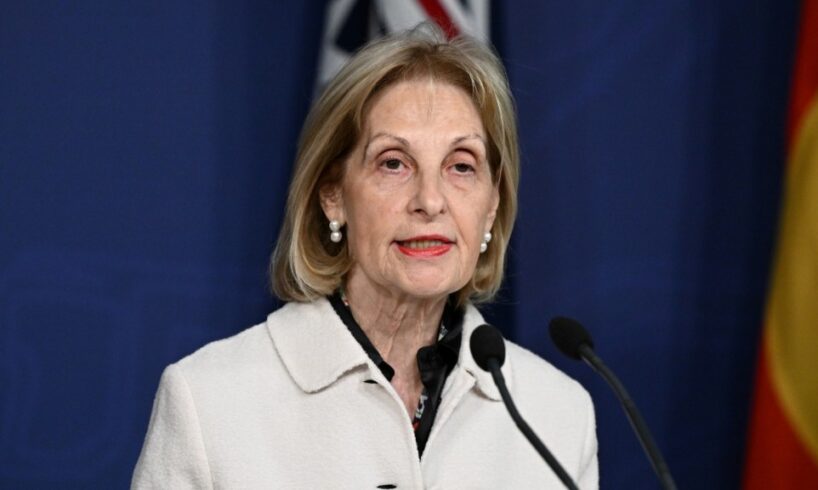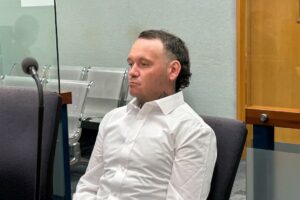
PLANS TO TACKLE ANTISEMITISM
The government’s special envoy to combat antisemitism Jillian Segal, alongside Prime Minister Anthony Albanese and Home Affairs Minister Tony Burke, outlined sweeping plans to tackle antisemitism in Australia yesterday. This morning the response to the recommendations tops numerous publications.
The AAP headlines its write-up with “‘Massive’ free speech concerns in antisemitism plan”, The Australian leads with “Anthony Albanese takes strong stand on antisemitism ‘but attacks must stop’”, the Nine papers declare “Jewish groups back antisemitism report, while critics warn of curbs on free speech”, Sky News reckons “ABC could be stripped of public funding as result of key recommendation by antisemitism envoy Jillian Segal”, and Guardian Australia states “Australian envoy’s antisemitism plan criticised as ‘Trumpian’ over concerns changes could be used to silence dissent”.
The ABC reports Segal’s plans involve the envoy working with government “to withhold funding from universities that fail to reduce hatred against Jewish students, monitor media organisations to ensure accurate coverage, and screen visa applicants for antisemitic views”.
Segal, who said she would also work with the government to review Australia’s hate speech laws, said on Thursday: “We cannot hope to really abolish antisemitism, but we can push it to the margins.” Albanese has said his government will now review the recommendations.
Guardian Australia reports some Jewish groups have backed the envoy’s plan. The Executive Council of Australian Jewry “strongly endorsed” the “urgently needed” measures, while the Australia/Israel & Jewish Affairs Council called for the plan to be adopted in full.
The ABC reports Segal has said she would assess universities with a “report card” of their implementation of practices to combat antisemitism.
The AAP says National Union of Students president Ashlyn Horton raised issues with the way student encampment protests were portrayed.
“Conflating actual antisemitism with criticism of Israel is a massive, massive concern. Most student activists who have been part of the Palestine movement have never actually been antisemitic … it is just students who are concerned about the genocide in Gaza and their universities’ involvement in weapons manufacturing,” she told the newswire.
“Spinning it in this way of ‘the encampments were antisemitic, we need to crack down on all freedom of speech now’ is absolutely the wrong approach.”
Meanwhile, Jewish Council of Australia executive officer Max Kaiser has called the report a “blueprint for silencing dissent”, with the AAP flagging his organisation “said the emphasis on surveillance, censorship and punitive control over funding were ‘straight out of Trump’s authoritarian playbook’”.
Guardian Australia reports Universities Australia’s CEO Luke Sheehy said of the recommendations: “Academic freedom and freedom of expression are core to the university mission, but they must be exercised with responsibility and never as a cover for hate or harassment.” Universities Australia has also said it would consider what Segal put forward in her review
The Australian points out University of Canberra vice-chancellor and former Labor leader Bill Shorten said the sector could not hide behind “academic freedom” and that universities needed to work with Segal.
Segal yesterday also recommended she monitor media organisations’ reporting. The ABC reports she claimed that while freedom of expression was vital, the funding for public institutions, such as festivals, art galleries and public broadcasters, should be able to be “readily terminated” where organisations facilitate antisemitism.
The Nine papers add: “Barrister Greg Barns SC, spokesman for the Australian Lawyers Alliance, said the recommendations represented a threat to freedom of speech and the right to protest and could result in draconian penalties.”
Barnes is quoted as saying Australia has international human rights obligations to freedom of expression and free speech, and that calls for new hate speech laws were “bizarre and dangerous” given the reforms earlier this year.
AUKUS REVIEW ‘COULD TAKE MONTHS’
As we mentioned yesterday, the UK’s AUKUS envoy is currently in town trying to reassure everyone that all is well with the submarine alliance.
That concern hasn’t really been alleviated though, with Stephen Lovegrove now declaring there is “a way to go” before US President Donald Trump receives advice on the defence alliance from the Pentagon review.
It has been pointed out by many that it has already been 30 days since the Pentagon review by Elbridge Colby was announced, but the briefings are now suggesting we may have to wait a fair while longer before we hear what he has to say.
Guardian Australia reports Labor sources believe the AUKUS review isn’t likely to be completed for months, while a Pentagon spokesperson admitted there was no public timeline for the work. The Australian has seemingly also received the same briefing (see The Commentariat below).
Speaking to the Australian Strategic Policy Institute, Lovegrove said: “I am anticipating that we will be in a position to reinforce and give supportive perspectives to the review. We’ve received messages that we will obviously be consulted. I think Australian colleagues have received very similar messages.
“AUKUS needs constant love and attention. It is a huge thing. It is protean and it will change its shape a bit as time goes on, and that is quite right too.”
Defence will no doubt be one of the main topics on Anthony Albanese’s mind when he travels to China this weekend for his meeting with President Xi Jinping and other officials and business leaders.
The Nine papers yesterday carried quotes from a private question-and-answer session after Albanese’s speech at the John Curtin Research Centre on Saturday, with the prime minister quoted as saying: “In the strategic competition that’s there in the world, we’re with the United States. We’re with democratic countries. We don’t shy away from that at all, of where our alliances are.
“I’m a supporter of AUKUS, that’s important. But that doesn’t mean that we are subservient to any other country.”
Meanwhile, The Australian Financial Review reckons the PM “will tap into tennis players and pandas as part of a six-day Chinese charm offensive emphasising trade and investment ties that underpin Australian jobs, while downplaying geopolitical tensions with Beijing”. The paper says Albanese is also being urged to not avoid difficult topics when he meets with senior Chinese leaders.
The Australian points out Foreign Affairs Minister Penny Wong “expressed alarm over Beijing’s strategic ambitions and surging military capabilities” while at the ASEAN Foreign Ministers’ Meetings in Malaysia yesterday.
“China continues to assert its strategic influence and project its military power further into our region,” Wong told the Institute for Strategic and International Studies. “And we have seen the worrying pace of China’s nuclear and conventional military build-up, without the transparency that the region expects.”
ISRAELI STRIKE KILLS CHILDREN NEAR GAZA CLINIC
In Gaza, the BBC reports a hospital has said at least 15 Palestinians, including eight children and two women, were killed in an Israeli strike while queuing for nutritional supplements in front of a clinic.
Project Hope, the US-based aid group that runs the clinic in the city of Deir Al Balah, said the attack was a blatant violation of international law, the British broadcaster adds.
The report says the “Israeli military said it struck a ‘Hamas terrorist’ and regretted any harm to civilians”. Israeli strikes elsewhere in Gaza reportedly killed another 37 people on Thursday.
In Ukraine, President Volodymyr Zelenskyy said on Thursday he has received positive signals on resuming US military aid, The Guardian reports.
Earlier in the day, US Secretary of State Marco Rubio told Russian Foreign Affairs Minister Sergey Lavrov that Trump was “disappointed” with the lack of progress on ending Russia’s invasion of Ukraine, the newspaper adds.
ON A LIGHTER NOTE…
Yesterday Moo Deng celebrated her first birthday. If you don’t know who Moo Deng is, 1. how dare you, and 2. Where have you been?
The internet’s favourite pygmy hippo is currently having a four-day festival at the Khao Kheow Open Zoo in Thailand thrown in her honour, AFP reports.
“The first day of the extravaganza falls on a Thai public holiday and the agenda includes a lecture on ‘Moo Deng’s cheekiness’, while a skincare beautician has paid $4,500 to sponsor her fruit-festooned cake,” the news agency adds.
It’s fair to say the coverage of the hippo these last 12 months has been absolutely and completely OTT.
To mark Moo Deng’s big birthday, The New York Times shared a video of the celebrations on Instagram, as well as resharing a feature on the birthday girl from back in February.
That piece reads: “Moo Deng doesn’t bounce like she did a couple months ago. But she still resembles a ripe avocado overstuffed with pâté. She retains a moist sheen. She snuffles. She yawns. She naps. She very occasionally sniffs her mother’s hindquarters, then recoils in a springy huff.” Normal times.
Sidebar: Yesterday I mentioned I’ve now been writing the Worm for a year. My task is obviously to showcase the main stories of the day and the way in which different publications are covering them, without introducing any opinion or analysis (that is the job of my fine colleagues).
I’m always keen to hear feedback on what you would like to see more or less of, so if you have anything you’d like to say (even if it’s just a hello), email me at Worm@crikey.com.au.
Say What?
I don’t care about tariffs any more. This is all self-imposed. What’s to stop them saying, let’s give it another three months?
Max Kettner
The Financial Times quotes the head of multi-asset strategy at HSBC in a piece that reckons investors are taking US President Donald Trump’s current tariff threats much less seriously than they took his previous rhetoric and are betting he will once again TACO [Trump Always Chickens Out] when the next deadline comes around.
CRIKEY RECAP
US firm adds consulting on Gaza ethnic cleansing to its sordid history — while pocketing $99m from taxpayers
Buildings lie in ruin inside the Gaza strip; the BCG logo (Image: Private Media/AAP)
Boston Consulting Group, the American consulting firm exposed for providing advisory services for a plan for the ethnic cleansing of Palestinians in Gaza, is the beneficiary of a $99 million contract from Australia’s own Department of Foreign Affairs — and it’s not the first time the firm has been exposed for its grubby dealings.
BCG went into damage control after the Financial Times revealed the firm had provided modelling for a plan by Israeli businessmen for the “reconstruction” of Gaza, involving a “Trump Riviera” and an “Elon Musk Smart Manufacturing Zone” — and the displacement of half a million Palestinians. The Netanyahu government, backed by the Trump administration, is actively planning for the ethnic cleansing of Palestinians and the establishment of a vast internment camp to contain much of the Gaza population.
How the media misinterprets Albanese’s China visit as a zero-sum game
At the risk of stating the obvious, framing every China-related foreign policy initiative and decision in terms of its implications for the US alliance — or vice versa — denies Australia’s capacity for independent foreign policy thinking, and forgets that both China and the US make their own decisions about Australia according to their own respective national interests.
In going to China or hoping to meet Trump, Albanese apparently hopes to advance Australia’s national interests, as informed by Australia’s own geography, economy and values. The binary logic of great power rivalry is most likely far from his mind. While reporting on either initiative is the job of our media, framing them by pitting the US against China seems to imagine Australia as a proxy actor in a US-China struggle, rather than as a sovereign middle power capable of shaping its own regional relationships.
Also, when our mainstream media characterises Australia’s improved relations with China as inherently undermining ties with the US, or when they report Australia’s difficulties with the US as a win for China — whether it be Albanese’s failure to secure a meeting with Trump or to obtain a tariff exemption — they seem to betray and further reinforce a zero-sum mentality.
‘This isn’t a one-off glitch’: Qantas pilots blast airline over data hack of 6 million customers
If Qantas were a person, it’d be that person at the bar who spills your drink, blames the table, and then proceeds to do nothing except make lame excuses and wander off without offering to buy you a fresh one.
The airline’s latest crisis? Last week’s cyber privacy breach involving 5.7 million customers’ personal data and, for a subset of those, frequent flyer data. More than a week after the data breach, Qantas appears none the wiser as to who perpetrated it or why. If it does, it is certainly not sharing that information with those affected: its customers. Qantas now says it knows who had what data stolen and is contacting those affected. Progressively.
READ ALL ABOUT IT
Gaza woman living in Sydney detained in pre-dawn raid over ASIO security risk ruling (The Australian)
Ukrainian intelligence officer shot dead in Kyiv in apparent assassination (CNN)
Some of Iran’s enriched uranium survived attacks, Israeli official says (The New York Times)
Seafarers from cargo ship attacked by Houthis rescued after 48 hours in water (The Guardian)
Zachary Rolfe considers appeal of findings in Kumanjayi Walker police shooting inquest (ABC)
These art collectors have lost $250k on NFTs. They still love them (AFR)
THE COMMENTARIAT
Childcare is a ‘canary in mine’ warning for wider problems in policy delivery — Michelle Grattan (The Conversation): When programs are growing very fast, the risk is that corners are cut in delivery. We saw this, disastrously, years ago during the global financial crisis when the Rudd government rolled out the home insulation scheme. A royal commission was damning about the failures of the program, which was marked by several deaths and many household fires. Safety had been compromised in the pursuit of speed and the delivery framework was inadequate.
There are many lessons from the childcare policy failures. A big announcement does not automatically mean a successful policy delivery. Programs can be working on some fronts while flawed on others. All new or expanded policies should come with detailed evaluation arrangements which are then carefully monitored. And while ministers will boast publicly about how well a policy is doing, they should be constantly demanding to know from their bureaucrats where things might be going wrong.
AUKUS review may take months as critics take aim at Eldridge Colby — Joe Kelly (The Australian): Politico quoted one source as saying that “he (Colby) is pissing off just about everyone I know inside the administration” and “they all view him as the guy who’s going to make the United States do less in the world in general”.
There are several relevant take-outs from this situation for Australia. First, The Australian can reveal that the Pentagon’s AUKUS review is not imminent and will not be delivered within 30 days. In fact, it is only now just beginning and is expected to take some time.
This will most likely be months rather than weeks.
Second, this means that Colby’s experience with Ukraine could influence both how far the AUKUS review is prepared to go — in terms of recommending changes — and how seriously they are taken by the administration.





